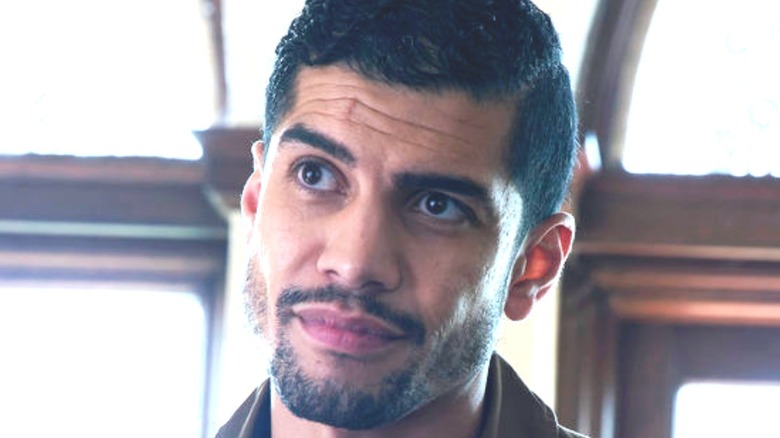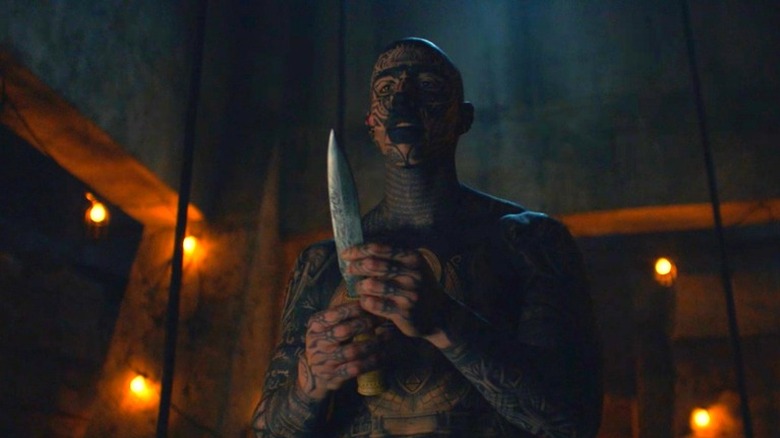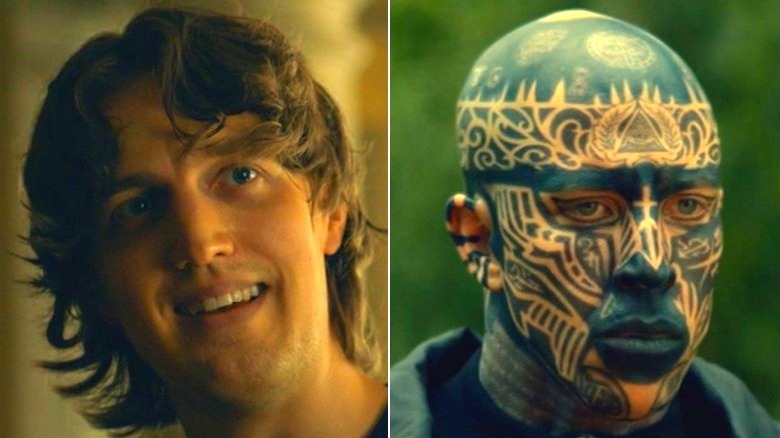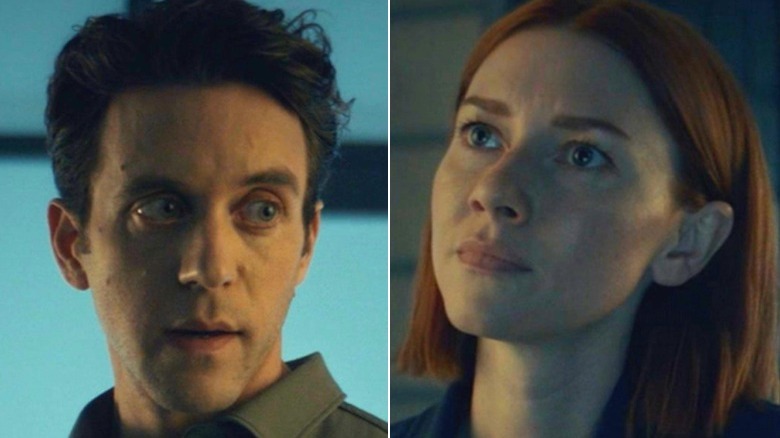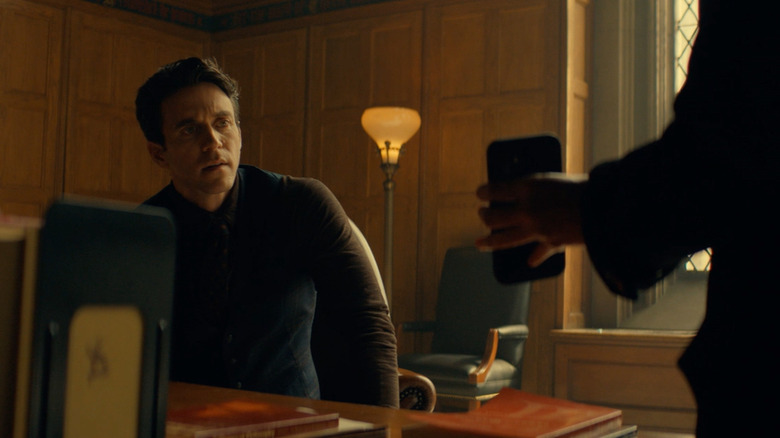The Ending The Lost Symbol Season 1 Explained
The first season of Peacock's adaptation of Dan Brown's 2009 novel "The Lost Symbol" has finally come to a close after a 10-episode television introduction. After searching through dozens (maybe hundreds) of clues, riddles, puzzles, historical artifacts, and plenty of symbols for Harvard Symbology professor Robert Langdon (Ashley Zukerman) to decipher, the team at the center of the search for the ancient wisdom (also repeatedly referred to as "a portal") has concluded its first adventure.
Though some members of the team (Peter Solomon [Eddie Izzard] and Inoue Sato [Sumalee Montano], for example) come out of the traumatic events more scarred than others, most of the central characters come out on top and ready for another adventure. Before fans can even start to think about a potential second season though, most will probably want to make sure that they completely understand every aspect of the finale. The following may not be "ancient" wisdom, but we can only hope it's wise enough to help fans of "The Lost Symbol" decrypt exactly what happened in the first season finale.
Obviously, spoilers abound for Season 1 of "The Lost Symbol." You've been warned.
Mal'akh wants Peter to kill him with a special knife
Peter Solomon has gone on quite a journey throughout the first season. In Season 1, Episode 6, he learns that the son he thought died in a Turkish prison has actually been transformed into a horrific monster. Despite acknowledging his son's substantial crimes, he is unwilling to kill his son (and probably even less eager to see Mal'akh turned into a God). However, before Peter refuses to commit pedicide, he marvels at the knife that Mal'akh presents to him as his weapon of destruction.
"This is iron from heaven," Mal'akh says. "A blade forged from a meteorite and touched by God, the day Abraham submitted to the volitions of the Supreme Being by proffering Isaac."
In response, Peter says, "The Akedah dagger?"
Mal'akh remarks, "It was never used for its true purpose, until now."
As with many historical artifacts in the series, the Akedah dagger refers to a story directly from the Bible. In Genesis 22, God commands that Abraham murder his only son, Isaac. Despite his love for his son, Abraham is prepared to sacrifice him if it is God's will that he die. Just before Abraham is about to slay Isaac — or in the moment he goes through with the act, in some interpretations — God tells Abraham, "Do not lay a hand on the boy. Do not do anything to him. Now I know that you fear God, because you have not withheld from me your son, your only son" (via Bible Hub).
According to Mal'akh, the blade that he wields in the finale is the same instrument that Abraham was once prepared to use on his son.
Mal'akh (aka Zachary Solomon) dies
A large part of the first season focuses on the characters' search for a mysterious ancient wisdom and the transformation of Zachary Solomon (Keenan Joliff) into the villainous Mal'akh (Beau Knapp), a quasi-religious figure willing to kill anyone in pursuit of ancient knowledge. After undergoing a spiritual awakening in a Turkish prison, Mal'akh descends upon Washington D.C. with the goal of turning himself into a God. In the last episode of the season, he requests that his father sacrifice him so that he can be reborn in a higher form, but he is ultimately killed by his sister, instead, after his plan falls to pieces.
Mal'akh's death at his sister's hand is a significant change from the novel. In both the book and the TV series, Peter Solomon ultimately refuses to kill Mal'akh, in spite of the myriad terrible crimes and atrocities that the younger Solomon has committed. The novel sees Mal'akh impaled by large, fallen shards of glass in a Masonic temple, but in the TV series, Katherine stabs her brother in the back in order to save Langdon. This change was likely made as a result of the series' writers aiming to give Katherine Solomon and Robert Langdon's relationship a more central focus for the series.
The ancient wisdom is revealed
The big danger at the end of Season 1 is Mal'akh's plan to use three so-called cascade machines to amplify what he calls "the frequency of creation" around the Washington Monument. In addition to creating symbols in water, the machines are referred to as "long range acoustic anti-personnel technology" and often result in deleterious effects to anyone unfortunate enough to get caught near one. In addition to the danger to people, there is also a possibility that such resonance could collapse the oldest parts of the 173-year-old structure. Mal'akh's goal is to create a triquetra symbol (aka the logo from "Charmed") in the basement of the Washington Monument in which he will be sacrificed and then subsequently resurrected as a God.
Unfortunately for Mal'akh, it is revealed that his fanaticism has led him down the wrong path. After all of the searching, discovering, translating, running, killing, and plethora of other tiresome activities involved in Mal'akh's journey, the "ancient wisdom" is revealed to be a simple Bible. Buried in the cornerstone of the monument, Langdon finds a hidden King James Bible. It turns out all Mal'akh needed to do was pop open a drawer at any hotel in America, where Gideons International would gladly provide him with a similar copy of the Word of God, free of charge.
Although, this alternative course of action likely would not have resulted in Mal'akh's eventual apotheosis as he hoped, it can't be said that his chosen path serves him much better. In the finale, only the first half of Mal'akh's plans to be killed and resurrected as a God is realized.
Robert Langdon and Katherine Solomon split up again
Robert Langdon and Katherine Solomon first dated prior to the main events of the series, but split up after Zachary's apparent death. They reform their relationship during the series and appear to be doing well together as a couple, following Zachary's real death. As they walk through the park, the two agree that they must take things slow if their relationship is going to work. In their final scene together, Langdon promises to return to Katherine in two weeks. However, a caption in the next scene reveals that a whole six months later, Langdon is nowhere near Katherine's home of Washington D.C. and he is still lecturing at Harvard.
A recurring theme throughout all "Robert Langdon" stories is the central protagonist's devotion to academia and apparent lack of commitment in romantic relationships. So far, every single Robert Langdon-led book and film has paired its protagonist with a new love interest (who normally also happens to be directly related to the mystery of that particular story). While it's not entirely clear if the television series is going to follow this trend, it wouldn't be an enormous surprise to see someone other than Katherine appear in this type of role in Season 2.
Sato recruits Langdon for another mission
One of the more interesting things about "The Lost Symbol" existing as a traditional series rather than as a limited series is the idea that the story will continue beyond Mal'akh's demise, an event that occurs in the Season 1 finale. In Dan Brown's original book, Mal'akh's death comes close to the conclusion of the story. With this thread now wrapped up in the television format as well, the question of where to go with the story becomes even more prominent.
"The Lost Symbol" is only one book in a series of novels written about Robert Langdon. Previous film adaptations of "The Da Vinci Code," "Angels & Demons," and "Inferno" have adapted some of the other popular offerings from Brown, but that doesn't mean that elements of those tales couldn't be pulled into a potential follow-up season of "The Lost Symbol." Continuing the story of "The Lost Symbol" would certainly mean either expanding the mythology of that particular book or moving onto other works by Dan Brown.
The last scene of the first season of "The Lost Symbol" provides audiences with some clue as to where the future of the series could lie. When Sato attempts to recruit Langdon for another mission, she mentions a "bombing in Europe" and shows Langdon something from the crime scene that he immediately recognizes. Audiences are not shown what this artifact is, but given Langdon's particular set of expertise, it is likely a religious symbol of some kind.
Since the series is formulated as a prequel to the Ron Howard films, it seems unlikely that the series would retread any ground in previously screen-adapted Robert Langdon books, but one novel, 2017's "Origin," has never yet been adapted. While the future of "The Lost Symbol" remains an open question at the time of this writing, it seems safe to assume that "Origin" could be used as inspiration for a potential second season.
